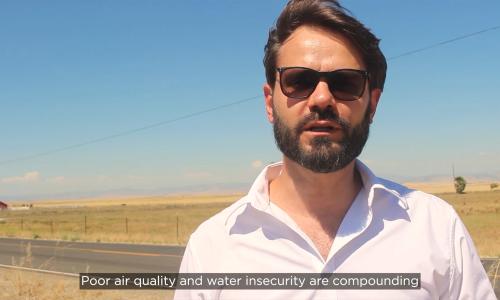In fall 1997, the Union of Concerned Scientists initiated the World Scientists' Call for Action at the Kyoto Climate Summit. This statement urged all government leaders to:
- act immediately to prevent the potentially devastating consequences of human-induced global warming
- demonstrate a new commitment to protecting the global environment
At the Climate Summit in Kyoto, Japan, held in December 1997, the nations of the world decided to strengthen the 1992 Framework Convention on Climate Change by agreeing to effective controls on human practices affecting climate.
In advance of the Summit, the Union of Concerned Scientists circulated the Call for Action for endorsement to leading scientists from around the world, including all scientists who had been awarded the Nobel Prize and National Academy-level scientists on all continents.
More than 1,500 scientists signed the Call for Action. Their signatures demonstrate that the world's senior scientific community believes that global warming is a serious threat, and that steps to address it must include complying with commitments made in the Kyoto Protocol. This strong climate-change treaty represents a landmark precedent for tackling other grave environmental problems, many of which have worsened in recent years.
- Total number of signatories as of October 14, 1997: 1,586
- Countries represented: 63
- Nobel laureates: 110, including 104 of the 178 living Nobel Prize winners in the sciences
- US National Medal of Science winners: 60
Call for action
Five years ago, in the World Scientists' Warning to Humanity, 1600 of the world's senior scientists sounded an unprecedented warning:
Human activities inflict harsh and often irreversible damage on the environment and on critical resources. If not checked, many of our current practices put at serious risk the future that we wish for human society and the plant and animal kingdoms.
Addressed to political, industrial, religious, and scientific leaders, the Warning demonstrated that the scientific community had reached a consensus that grave threats imperil the future of humanity and the global environment. However, over four years have passed, and progress has been woefully inadequate. Some of the most serious problems have worsened. Invaluable time has been squandered because so few leaders have risen to the challenge.
The December 1997 Climate Summit in Kyoto, Japan, presents a unique opportunity. The world's political leaders can demonstrate a new commitment to the protection of the environment. The goal is to strengthen the 1992 Framework Convention on Climate Change by agreeing to effective controls on human practices affecting climate.
This they can and must do, primarily by augmenting the Convention's voluntary measures with legally binding commitments to reduce industrial nations' emissions of heat-trapping gases significantly below 1990 levels in accordance with a near-term timetable. Over time, developing nations must also be engaged in limiting their emissions. Developed and developing nations must cooperate to mitigate climatic disruption. The biosphere is a seamless web.
Completion of an effective treaty at Kyoto would address one of the most serious threats to the planet and to future generations. It would set a landmark precedent for addressing other grave environmental threats, many linked to climate change. It would demonstrate that the world's leaders have now recognized, in deeds and words, their responsibility for stewardship of the earth. The stark facts carry a clear signal: there is only one responsible choice -- to act now.
We, the signers of this declaration, urge all government leaders to demonstrate a new commitment to protecting the global environment for future generations. The important first step is to join in completing a strong and meaningful Climate Treaty at Kyoto. We encourage scientists and citizens around the world to hold their leaders accountable for addressing the global warming threat. Leaders must take this first step to protect future generations from dire prospects that would result from failure to meet our responsibilities toward them.
The web of environmental effects
Predictions of global climatic change are becoming more confident. A broad consensus among the world's climatologists is that there is now "a discernible human influence on global climate."
Climate change is projected to raise sea levels, threatening populations and ecosystems in coastal regions. Warmer temperatures will lead to a more vigorous hydrologic cycle, increasing the prospects for more intense rainfall, floods, or droughts in some regions. Human health may be damaged by greater exposure to heat waves and droughts, and by encroachment of tropical diseases to higher latitudes.
The developing world is especially vulnerable to damage from climatic disruption because it is already under great stress and has less capacity to adapt.
Climate change: linkages and further damage
Destructive logging and deforestation for agriculture continue to wreak havoc on the world's remaining tropical forests. The burning of the Amazonian rain forests continues largely unabated. Other forests in developed and developing nations are under heavy pressure. Destruction of forests greatly amplifies soil erosion and water wastage, is a major source of loss of species, and undermines the environment's natural ability to store carbon. It releases additional carbon to the atmosphere, thereby enhancing global warming.
Fossil-fueled energy use is climbing, both in industrial nations and in the developing world, adding to atmospheric carbon. Efforts to enhance energy conservation and improve efficiency are much hindered by low energy costs and by perverse incentives that encourage waste. Without firm commitments, most industrial nations will not meet the carbon-emission goals they agreed to at the 1992 Rio conference. The transition to renewable, non-fossil-carbon-based energy sources is feasible but is not in sight for lack of aggressive political will. The insurance industry has recognized the risks posed by climate change. Leading economists have identified viable policies for reducing these risks. Markets undervalue ecosystems worldwide and inflict few penalties against practices that do long-term environmental and resource damage. Political leadership must introduce incentives that reward sound practices.
Water scarcity and food security
Humanity now uses over one-half of the total accessible freshwater runoff. Freshwater is the scarcest resource in the Middle East and in North Africa. Efforts to husband freshwater are not succeeding there, in East Asia, or in the Pacific.
Global food production now appears to be outpaced by growth in consumption and population. There is broad agreement that food demand will double by 2030. Most land suitable for agriculture is already in production. Sub-Saharan Africa's increase in agricultural production is one-third less than its population growth. The region now produces 80 percent of what it consumes, and per capita production is declining. Projections indicate that demand for food in Asia will exceed the supply by 2010.
Thus, food consumption levels in many countries are likely to remain totally inadequate for good nutrition. Widespread undernutrition will persist unless extraordinary measures are taken to ensure food for all, measures not now even contemplated by governments. Climate change is likely to exacerbate these food problems by adversely affecting water supplies, soil conditions, temperature tolerances, and growing seasons.
Destruction of species
Climate change will accelerate the appalling pace at which species are now being liquidated, especially in vulnerable ecosystems. One-fourth of the known species of mammals are threatened, and half of these may be gone within a decade. Possibly one-third of all species may be lost before the end of the next century.
Biodiversity gives stability to the ecosystems that we are so dependent on, enhances their productivity, and provides an important source of new foods, medicines, and other products.



